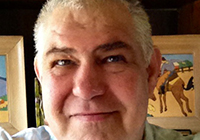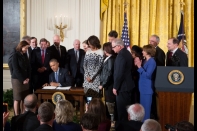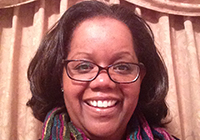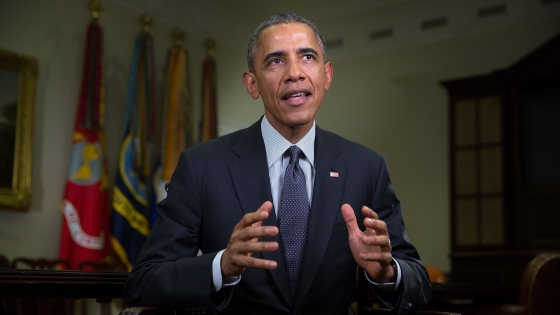Thank You
For your submission
-
"I don't think there's anybody in America who's had a chance to talk to these six young people ... who wouldn't find it in their heart to say these kids are Americans just like us, and they belong here, and we want to do right by them."
President Barack Obama, 2/4/2015
Each of the young people who stood in the Oval Office yesterday had one thing in common: They were all brought here by parents dreaming of a better life for their children in America.
Some of them arrived when they were simply months old. They were raised in American communities, often not realizing their status was any different from that of their classmates or neighbors. Many of them, as the President noted in remarks at the end of the meeting, didn't discover that there was something different about them -- something that might prevent them from giving back to their community and their country -- until they were about to go to college.
Their experiences are emblematic of those of millions more young people across the country, and Executive Actions taken by this Administration with regard to DREAMers -- along with Executive Actions announced last year to provide nearly 4 million immigrants with a path to earned citizenship -- have transformed their lives. These actions have made college a reality for young people who didn't previously think it was an option for them. They have helped them start small businesses and better provide for their families. Most importantly, they've allowed them to more fully contribute to the country they know as home.
Yesterday, six of these young people met with the President for a conversation in the Oval Office. These are their stories.
-

"Mr. Obama is one brave man."
Carolyn S. from California wrote the White House in October to share how much she appreciates the Affordable Care Act -- and to thank President Obama for his efforts to see it through.
-
Last January, recognizing that innovative big data technologies and tools are changing our economy, our government, and our society, President Obama charged me with leading a 90-day review of big data and privacy. Our working group found that we live in a world of near-ubiquitous data collection in which that data is being crunched at speeds increasingly approaching real time — a data revolution that presents incredible opportunities to transform health care, to boost economic productivity, and to make government work better and save taxpayer dollars.
At the same time, big data technologies raise serious concerns about how we protect personal privacy and our other values. As more data is collected, analyzed, and stored on both public and private systems, we must be vigilant in ensuring the balance of power is retained between government and citizens and between businesses and consumers. And one novel finding of the working group report was the potential for big data technologies to circumvent longstanding civil rights protections and enable new forms of discrimination in housing, employment, and access to credit, among other areas.
Today, we’re releasing an interim progress report detailing the progress we have made — and what we still have ahead. We’re also moving forward with the commitment the President made last month to ensure that student educational data is used only for educational purposes. The Administration has been working with a bipartisan group of legislators, and today Congressman Luke Messer (R-IN) and Congressman Jared Polis (D-CO) will announce that they will be introducing legislation to fulfill that promise. In the Senate, Senator Richard Blumenthal (D-CT) also intends to pursue bipartisan legislation. And the Council of Economic Advisers is releasing a new report on price discrimination in the big-data era, as part of the Administration’s commitment to deeply examine how these new technologies may inadvertently or deliberately lead to discriminatory outcomes, and what policy mechanisms may be needed to respond.
-

"Dear Mr. President, you saved my life and I can never thank you enough."
For 12 years, Bill, a 55-year-old man from New Jersey, wasn't able to afford health insurance as a self-employed person. After the passage of the Affordable Care Act, however, his state decided to expand Medicaid, and Bill became eligible for health insurance under the expansion.
It happened just in time. Last year, Bill experienced swelling and tingling in his legs and feet, and was having difficulty breathing. Under his new coverage, he was able to make an appointment with a doctor to get to the bottom of what was happening.
-
Student Elana Simon sent the following message to the White House email list today, sharing how Precision Medicine -- a cutting-edge new way of treating disease -- changed her life, and how it could change the lives of millions more Americans.
Didn't get the email? Sign up to receive messages like this one here.
Fibrolamellar hepatocellular carcinoma.
It's not a term that any kid typically knows, or should ever have to learn first-hand. But when I turned 12 years old, that was my diagnosis -- and it became a defining part of my life.
It's a specific kind of liver cancer that affects children. It's rare -- you don't see it in your average patient. So I knew, even then, that it would take something more than a generic treatment to cure this unique disease.
So I got to work. And thanks to incredible technological advances and the help of a community of scientists and fibrolamellar patients like me, I was able to identify the change in the DNA that leads to this kind of cancer. Rather than focusing broadly on all liver cancer, I examined a precise patient group -- which allowed for such a precise discovery.
Today, I'm 19 years old, in college, and in remission.
There's a name for the approach we used. It's called "Precision Medicine" -- an approach that uses data-driven treatments that are unique to your own body. It's a proven way to treat more difficult diseases. And it's a field of medicine the President's 2016 budget is investing in.
-
Once again, House Republicans voted to repeal or undermine the Affordable Care Act and take health coverage away from millions of Americans. Today's vote adds yet another tally mark to the more than 50 times they have tried -- and failed -- to repeal or undermine health care reform.
It bears repeating: That's 50 votes to rob Americans of much-needed health coverage, while blocking votes to pass laws that will actually help hardworking Americans gain economic security in the 21st century economy:

Given the sheer number of times House Republicans have tried to repeal this historic legislation, you may be wondering: What would happen if they actually succeeded?
-
Today, the White House Domestic Policy Council and the Curb Cuts to the Middle Class Initiative hosted the White House Summit on Disability and Employment. The Summit provided businesses, philanthropies, and disability advocates with information about new and existing Federal resources designed to help employers hire more individuals with disabilities, including the new Resource Guide for Employers. The Summit also offered opportunities for attendees to share their experiences in diversifying their workforce through effective strategies to successfully recruit, hire, promote, and retain employees with disabilities.
Jenny Lay-Flurrie is an example of someone who is not only able to accommodate her disability in the workplace, but was able to turn a disability into an asset. Jenny nearly walked away from a promotion when she felt that her deafness and inability to use a mobile phone would end her budding career at an internet company. Luckily, Jenny’s boss had no intention of letting so much talent walk away so easily and encouraged her to advocate for what she needed. Jenny got top-of-the-line hearing aids and worked with her boss to create a culture of awareness within the company about deafness and hearing loss. Jenny continued to take on bigger roles at that company and several other companies, before becoming a Senior Director at Microsoft, where she leads the Trusted Experiences Team (TExT), which focuses on accessibility, privacy, and online safety. Her disability is a benefit to Microsoft, giving the company insight on customers with disabilities around the world, which helps create better products for consumers.
-
As House Republicans are voting to repeal the Affordable Care Act -- today actually marks more than 50 times they've voted to repeal or undermine it -- the law continues to help and save the lives of millions of Americans.
Thanks to ACA, countless people have been able to get regular checkups at the doctor, fix life-threatening health problems, and not experience financial ruin as a result.
A number of people who have benefited from the law have written the President just to say "thank you" -- and today, the President met with 10 of those letter-writers here at the White House. Their stories are below.
Unfortunately, there are still millions of uninsured Americans who don't know why it's so important to get covered, or how they stand to benefit. And it's on each and every one of us to change that.
If you know someone who needs to get health insurance, share these stories with them. And if you're the one that needs to get covered, visit HealthCare.gov right now and sign up for a plan before the February 15 deadline.

Derrick Benn, San Francisco, CA
When the Health Insurance Marketplace opened in 2014, Derrick shopped on California's state-based health exchange and realized that he qualified for Medicaid.
Read more
-
As a nation, we pause this February to honor Black History Month and all those who came before us. Throughout February, the White House will pay tribute both to the accomplishments of some of our country’s greatest historical giants, while also taking time to highlight stories from those whose contributions aren’t always captured in the telling of our nation’s history.
Yesterday, President Obama welcomed Dr. Clarence Jones and his family to the Oval Office. Dr. Jones was a close personal aide to Dr. Martin Luther King, Jr. and a co-author to Dr. King’s "I Have a Dream" speech.
Later this month, we will host a Champions of Change event to highlight outstanding achievements by members of the HBCU community, and a number of calls and briefings to discuss the President’s agenda as it relates to African American communities.
There are countless men and women whose names may not appear prominently in our history books, but whose sweat, blood, and strength is woven into our national identity and continues to inform our sense of pride and dignity as Americans. Every day this month, I will be tweeting out their stories. To take part, follow me at @vj44 and tweet your suggestions of champions of Black history you think deserve to be highlighted. Make sure to use the hashtag #BlackHistoryMonth.
-
Earlier this afternoon, President Obama welcomed Clarence B. Jones — Dr. Martin Luther King, Jr.'s personal attorney and advisor — to the White House.
-
In a fitting tribute to Groundhog's Day, the L.A. Kings and L.A. Galaxy returned to the White House to celebrate their championship seasons -- again. Two years ago, the two teams joined President Obama in the East Room -- the L.A. Galaxy as the top team in Major League Soccer, and the L.A. Kings as the winners of hockey's most prestigous award, the Stanley Cup.
Today, they were back after repeating those victories. "So if you see Bill Murray playing the piano in the foyer, you know something weird is going on," the President said. "And we're probably going to do this again."
Watch the President's remarks:
-
-
"It's not the end of the world." That's what one Republican Congressman thinks of his colleagues' plan to let funding expire for the Department of Homeland Security (DHS) -- one of the chief agencies responsible for the safety and security of the American people.
Today, in a speech at DHS headquarters, President Obama directly addressed this threat from the Republican-led Congress:
If Republicans let Homeland Security funding expire, it’s the end to any new initiatives in the event that a new threat emerges. It’s the end of grants to states and cities that improve local law enforcement and keep our communities safe. The men and women of America’s homeland security apparatus do important work to protect us, and Republicans and Democrats in Congress should not be playing politics with that.
-
February 02, 2015
01:47 PM EST
The Budget and Accounting Act of 1921 stipulated that each year, the President must submit his budget request for the following fiscal year to Congress.
According to current law:
On or after the first Monday in January but not later than the first Monday in February of each year, the President shall submit a budget of the United States Government for the following fiscal year.
Today, we're able to communicate with more Americans than ever before, which means our budget presentation looks a lot different than it did decades ago. Here are five things that are new and different about the Fiscal Year 2016 budget.
Happy Budget Day: Dig in, geek out, and let your inner wonk shine.
This is our nation's first open-sourced budget.
Both the budget itself -- and the process by which we release it -- should be a reflection of our values as a country. We want to make it possible for as many members of the American public as possible to review the President's proposals, and have clear opportunities to provide feedback. This year, we're releasing all of the data in the FY 2016 budget in an easy, machine-readable format on GitHub, a website for hosting open-source projects. That way, anyone who wants to create their own visualizations or products from the data is free to do so.
-

Each year, after the President's State of the Union address, the Office of Management and Budget releases the Administration's Fiscal Year budget, offering proposals on key priorities and newly announced initiatives. This year, we did things a little differently, from our expanded and enhanced State of the Union coverage to our interview with YouTube creators -- and we wanted to do the same with the budget.
That's why we're releasing all of the data included in this year's budget in an easy, machine-readable format on GitHub, a website for hosting open-source projects. The budget process should be a reflection of our values as a country, and we think it's important that members of the public have as many tools as possible at their disposal to review the President's proposals -- and to have an opportunity to give feedback. And, if you're motivated to create your own visualizations or products from the data, you can do that too.
-
In this week’s address, the President described the progress our economy has made, laying a foundation for a future that prioritizes middle-class economics.
This week, the President will send a budget to Congress centered on the idea that everyone who works hard should have the chance to get ahead. His plan will reverse harmful sequestration cuts and instead make paychecks go further, create good jobs here in the United States, and prepare hardworking Americans to earn higher wages. The President made the case for his budget, and affirmed his commitment to doing everything he can to ensure more Americans can get ahead in this new economy.
Transcript | mp4 | mp3
-
This week, the President traveled to India, launched the new Precision Medicine Initiative, and called on Congress to protect the Arctic National Wildlife Refuge.
Find out more about the past week at the White House in our latest weekly wrap-up.
A Historic Visit to India
“Chalein saath saath.” It means "forward together we go," and it perfectly sums up the President's recent trip to India.
The President and First Lady traveled to India this week -- their first time visiting since Indian Prime Minister Narendra Modi was sworn in on May 26, 2014. President Obama also made history as the first sitting U.S. president to visit India twice.
President Obama tosses petals on a monument at Rajghat, a memorial to Mahatma Gandhi: http://t.co/2mTTydbrXl pic.twitter.com/z49fljXNti
— The White House (@WhiteHouse) January 26, 2015
The United States and India are true global partners, both in strengthening economies and strong democracies. From a pledge on fighting climate change to beautiful parades, the trip was full of notable moments.
-
Six years after the financial crisis, America’s resurgence is real and beginning to touch more and more lives across the country. As the President said, “With a growing economy, shrinking deficits, bustling industry, and booming energy production, we have risen from the recession freer to write our own future than any other nation on Earth.”
America’s businesses are already setting pen to paper, creating jobs in burgeoning industries at a breakneck pace. In fact, there are more open jobs today than at any point since 2001.
Whether in information technology, health care, or other growing industries, there are more jobs now that offer higher wages and an important step up into the middle class. Here’s the chart to prove it:

-
Today, First Lady Michelle Obama’s Reach Higher initiative closed out the week with a very special thank you to some of the hardest-working, caring, and critically important adults charged with putting young people on the path to college: America’s school counselors.
In collaboration with the American School Counselor Association (ASCA), the White House, for the first time ever, hosted the Counselor of the Year Ceremony. The First Lady, along with television star Connie Britton, spoke in the East Room to honor the 36 finalists and semi-finalists, and 2015 School Counselor of the Year, Cory Notestine.
This past July, when the First Lady spoke at the ASCA Annual Conference in Orlando, Florida, she declared that “school counseling is a necessity to ensure that all our young people get the education they need to succeed in today’s economy.” She also promised to bring the Counselor of the Year Ceremony to the White House – and this afternoon, that promise became a reality.
-
January 30, 2015
03:30 PM ESTWhen Hurricane Sandy hit New York City, the storm sent water cascading into the South Ferry subway station, pouring into the Brooklyn-Battery Tunnel, inundating neighborhoods from Staten Island to Queens. At Battery Park in lower Manhattan, water reached more than 9 feet above the average high-tide line.
One factor fueling the surge -- New York Harbor, where waters have risen about a foot since 1900. We know that rising sea levels, higher average temperatures, higher ocean temperatures, and other effects of climate change will make extreme weather events more frequent and more severe. And the climate is changing -- earlier this month, NASA and NOAA announced that 2014 was the hottest year on record globally, meaning that 14 of the 15 hottest years in recorded history have happened this century.
That’s why when we invested billions to help communities rebuild from Sandy, we also committed to “build back better” -- to rebuild infrastructure to a higher standard so it can withstand the increased risks posed by sea level rise and other climate impacts.
Today, the White House is building on that experience by releasing a new flood risk management standard for new and rebuilt federally funded structures in and around floodplains. This new resilience standard will help ensure taxpayer dollars are well spent on infrastructure that can better withstand the impacts of flooding.
- &lsaquo previous
- 1
- 2
- 3
- 4
- 5
- 6
- 7
- 8
- 9
- …
- next &rsaquo
























